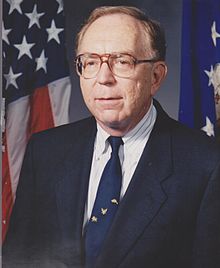Ed Feigenbaum | |
|---|---|
 | |
| Born | Edward Albert Feigenbaum (1936-01-20) January 20, 1936 (age 88) Weehawken, New Jersey |
| Nationality | American |
| Alma mater | Carnegie Mellon University (BS, PhD) |
| Known for | Expert systems EPAM DENDRAL project Feigenbaum test |
| Awards | Turing Award (1994) Computer Pioneer Award AAAI Fellow (1990) ACM Fellow (2007) |
| Scientific career | |
| Fields | Computer science Artificial intelligence |
| Institutions | Stanford University United States Air Force |
| Doctoral advisor | Herbert A. Simon |
| Doctoral students | Ramanathan V. Guha
|
| Website | ksl-web |
Edward Albert Feigenbaum (born January 20, 1936) is a computer scientist working in the field of artificial intelligence, and joint winner of the 1994 ACM Turing Award. He is often called the "father of expert systems."